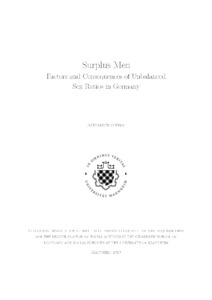|
Surplus men : Factors and consequences of unbalanced sex ratios in Germany
Scherf, Alexander
![[img]](https://madoc.bib.uni-mannheim.de/53441/1.hassmallThumbnailVersion/Scherf_diss_final_1811.pdf)  Vorschau |
|
PDF
Scherf_diss_final_1811.pdf
- Veröffentlichte Version
Download (27MB)
|
|
URL:
|
https://madoc.bib.uni-mannheim.de/53441
|
|
URN:
|
urn:nbn:de:bsz:180-madoc-534414
|
|
Dokumenttyp:
|
Dissertation
|
|
Erscheinungsjahr:
|
2019
|
|
Ort der Veröffentlichung:
|
Mannheim
|
|
Hochschule:
|
Universität Mannheim
|
|
Gutachter:
|
Schmidt-Catran, Alexander
|
|
Datum der mündl. Prüfung:
|
8 November 2019
|
|
Sprache der Veröffentlichung:
|
Englisch
|
|
Einrichtung:
|
Außerfakultäre Einrichtungen > GESS - CDSS (SOWI)
Fakultät für Sozialwissenschaften > Sociological Methodology (Gautschi 2009-)
|
|
Lizenz:
|
 Creative Commons Namensnennung 4.0 International (CC BY 4.0)
Creative Commons Namensnennung 4.0 International (CC BY 4.0)
|
|
Fachgebiet:
|
300 Sozialwissenschaften, Soziologie, Anthropologie
|
|
Freie Schlagwörter (Englisch):
|
surplus men , sex ratio , xenophobia
|
|
Abstract:
|
Sex ratios in the human population are remarkably constant in the absence of manipulation. However, human manipulation distorts these natural sex ratios in large parts of the world. As found by numerous studies, this change in sex ratios has a tremendous impact on social realities. Although less dramatic in origin and size, compared to Asian and African countries, qualitatively similar cohorts of surplus men have also emerged in rural areas of Germany, offering a unique case in Europe. This change was not achieved by a particular preference for sons or a specific family structure, but by a sex-specific migration. In these rural regions, especially in the area of the former GDR disproportionally more women left structurally weak districts during the almost three decades after reunification.
The aim of this thesis is first to explain the reasons why particularly women leave these regions. With the use of a newly created regional-level dataset on demographics covering all German regional districts over the last 20 years, it is possible to estimate the demographic factors, which influence sex-specific migration. The theory-led approach identifies economic and social factors contributing to the explanation of migration. These factors affect men and women differently, making it easier for women to emigrate from a region. Empirical results from the hybrid model regression indicate that females in several rural, regional districts can migrate because of higher educational aspirations and a higher tendency to work, compared to their male counterparts. Also, economic factors like unemployment and income differences contribute to the migration of both males and females. The final result of the first part of this thesis is that females have a lower threshold to surpass to migrate than males. This ultimately leads to the establishment of a new low social class of mostly young, poorly educated men in structurally weak regions all over Germany.
After the documentation and empirical analysis of the factors that lead to a male surplus, the second part of this thesis examines the direct and indirect effects of this surplus. An initial analysis leads to the identification of the direct consequences of disproportionate sex ratios. First, there are problems regarding the cohabitation, which is noticeable in a devaluation of partnerships. Connected to this, individual and collective relative deprivation as well as anomia are also considered to be outcomes. Empirical results indicate that a surplus of men leads to fewer marriages in rural districts, a heightened probability for people in these districts to be in a state of anomia and more likely to feel a sense of individual relative deprivation. Most of these findings are present in East and West Germany, even when controlling for demographic and structural factors.
Complementing the former analysis of the direct effects of surplus men, several additional consequences, which are resulting from these, are identified and empirically tested. Based on a broad theoretical foundation, it is argued in the third chapter, that xenophobia, nationalism and the election of right-wing parties is connected to deprivation and anomia. Following this argumentation, an extensive model is created and empirically tested with a longitudinal database. Key results are, that not only the voting behaviour but also national pride and xenophobic tendencies are strongly connected to individual and collective relative deprivation and anomia. Finally, a relationship between surplus males and national pride is found.
|
 | Dieser Eintrag ist Teil der Universitätsbibliographie. |
 | Das Dokument wird vom Publikationsserver der Universitätsbibliothek Mannheim bereitgestellt. |
 Suche Autoren in Suche Autoren in
Sie haben einen Fehler gefunden? Teilen Sie uns Ihren Korrekturwunsch bitte hier mit: E-Mail
Actions (login required)
 |
Eintrag anzeigen |
|
|
